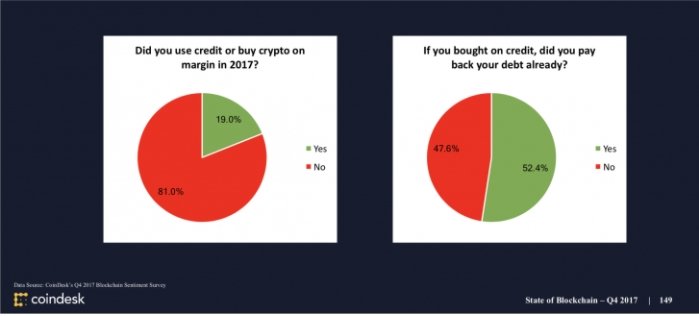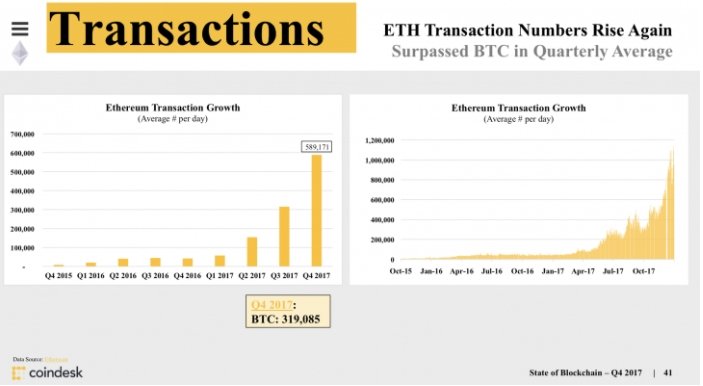If bitcoin is in a bubble, it is one of the few in the history of finance – if not the first – that expanded with negligible use of credit.
That's just one of the unique takeaways from CoinDesk's State of Blockchain 2018 report, the latest in the quarterly series setting out our in-depth research on the rapidly evolving world of cryptocurrencies and the technologies they've inspired.
Released Wednesday, the report provides a 160-plus slide analysis of some of the data points propelling this story forward.
The report covers public blockchains, DLT, consortium chains, initial coin offerings (ICOs), trading and investments, and regulation, and also features the results of our 70-plus question sentiment survey, which provides insight from over 3,000 CoinDesk readers.
Here are five of the most significant trends that defined both Q4 and 2017:
- This is not your father's investment bubble
Bitcoin went on a super run in 2017 with returns for the year at 1,278 percent. Along with all the mainstream attention came discussion of whether the original and still largest cryptocurrency was in a bubble.
Our own readers were split on this, with about 49 percent answering "yes," 39 percent saying "no" and 11 percent who were neutral. Deeper than this split of opinion, our survey provided a much needed data point around the whole speculative bubble conversation.
Only 19 percent of our respondents went into debt to buy crypto, and of those who did, over half paid back their loans. The important and historic takeaway is that if bitcoin is indeed a bubble, it is the rare kind that has inflated with little leverage or borrowed money. (Margin trading on the exchanges was recently introduced, but it is limited and typically offered on a peer-to-peer basis.)
In short, bitcoin has made it this far without help from Wall Street or banks (unless you count the wholesale closing of accounts to certain industries and geographies by risk-averse financial institutions, which may inadvertently drive those de-banked users to use a permissionless system).
This marks the first time in recent memory average people have been ahead of the so-called "smart money" – another chapter in the ongoing narrative that bitcoin and cryptocurrencies are the most interesting story worldwide in finance and economics.

- The market has significantly diversified
In January 2017, bitcoin’s value represented over 90 percent of the cryptocurrency market. Ethereum had a huge developer following, but its trade volumes were still quite small. But when its first "killer app," the ERC-20 smart contract to generate tokens and ICOs, began to gain traction in Q2 2017, the whole story changed.
Demand for ether (generally needed to participate in many ICOs) grew, and so did the ability to finance and create new blockchains. This chipped away at bitcoin's dominance in the market until Q3, when bitcoin reversed the downtrend.
The timing of that shift appears to line up with bitcoin's adoption of Segregated Witness and the end of confusion around the bitcoin cash fork. While bitcoin steadily won back its dominance score, it waned again in December as ethereum had its best month of the year, driven by the ICO boom.
The market also diversified with the rise of an institutional crypto buy side, as hundreds of new funds formed to get exposure to this new asset class.
- Ethereum continues to set all-time transaction records
ICOs helped push demand for ethereum in 2017, but they weren’t the only app that made news.
CryptoKitties took the world by storm in December, adding another interesting wrinkle to ethereum's magic year. While many criticized the silliness of the Kitties, the novel blockchain use case nevertheless made its mark.
While ethereum had already broken its transaction records in the third quarter, the digital collectibles app, along with the upgrades from the Byzantium hard fork, helped ethereum nearly double the volumes achieved just a few months earlier.
Whimsical though it may be, CryptoKitties helped paint a full picture of ethereum's current capabilities.

- Korea fills the void left by China
From the outset of 2017, China signaled the year was going to be different than in the past.
This all came to fruition in September when China banned ICOs, then shut down bitcoin exchanges in the country.
Any look at trade volumes and markets pre-2017 would have led the reader to believe that bitcoin and cryptocurrencies would suffer from this loss. But even with all Chinese exchanges closing on the final day of Q3, bitcoin promptly went on its greatest bull run ever.
In short, it seemed no one cared that China was out. Rather, it was an opportunity for new players.
South Korea, for one, became an important cryptocurrency trading hub in Q3 and Q4 – taking up much of the void left by China. The Korean won became one of the highest-volume paired currencies in the industry, with particularly high XRP and ETH volumes.
- ICOs were big, but forks and airdrops were much bigger
While the entire early-stage financing industry heard the call of ICOs in 2017, they were a blip when compared to other token-generating events.
Forks and airdrops come with a built-in user base (generally bitcoin HODLers) and were much more significant to the overall market cap in cryptocurrencies.
The bitcoin cash fork was the first to surprise the industry with the interest it generated, catching several exchanges flat-footed when users demanded their inherited property. Stellar too offered airdrops of its native currency, lumens, to bitcoin holders, leading some to believe this will be a more widely used strategy going forward.
https://www.coindesk.com/coindesk-releases-2018-bitcoin-blockchain-industry-report/
Hi! I am a robot. I just upvoted you! I found similar content that readers might be interested in:
https://www.coindesk.com/coindesk-releases-2018-bitcoin-blockchain-industry-report/
hehehe~ thanks~
Wow I am surprised how much people took credit to invest in crypto. It's just crazy if you are not in crypto world for a few years and you predicted price jump before it reached 1000$.
Did anyone of you took credit and when?